CIPD Assignment: Navigating Legal Issues in Employment and HR Policies
VerifiedAdded on 2023/06/03
|7
|1592
|104
Report
AI Summary
This CIPD Module 2 assignment solution delves into the legal requirements impacting employment relations, focusing on UK labor laws. It covers crucial aspects such as working time regulations, legal protections for individuals working with young children (maternity and paternity leave), and the legal considerations for determining pay scales, ensuring fair and non-discriminatory practices. The report also addresses discrimination legislation, emphasizing the importance of a fair and just work environment free from bias based on gender, race, or other personal attributes. Furthermore, it touches upon the psychological contract between employers and employees, highlighting the intangible understandings and commitments that shape the employment relationship. The assignment concludes with reflections on the module, underscoring the importance of understanding HR policies and labor law regulations.

Running head: CIPD
CIPD Certification Module 2
Name of the Student
Name of the University
Author’s note
CIPD Certification Module 2
Name of the Student
Name of the University
Author’s note
Paraphrase This Document
Need a fresh take? Get an instant paraphrase of this document with our AI Paraphraser
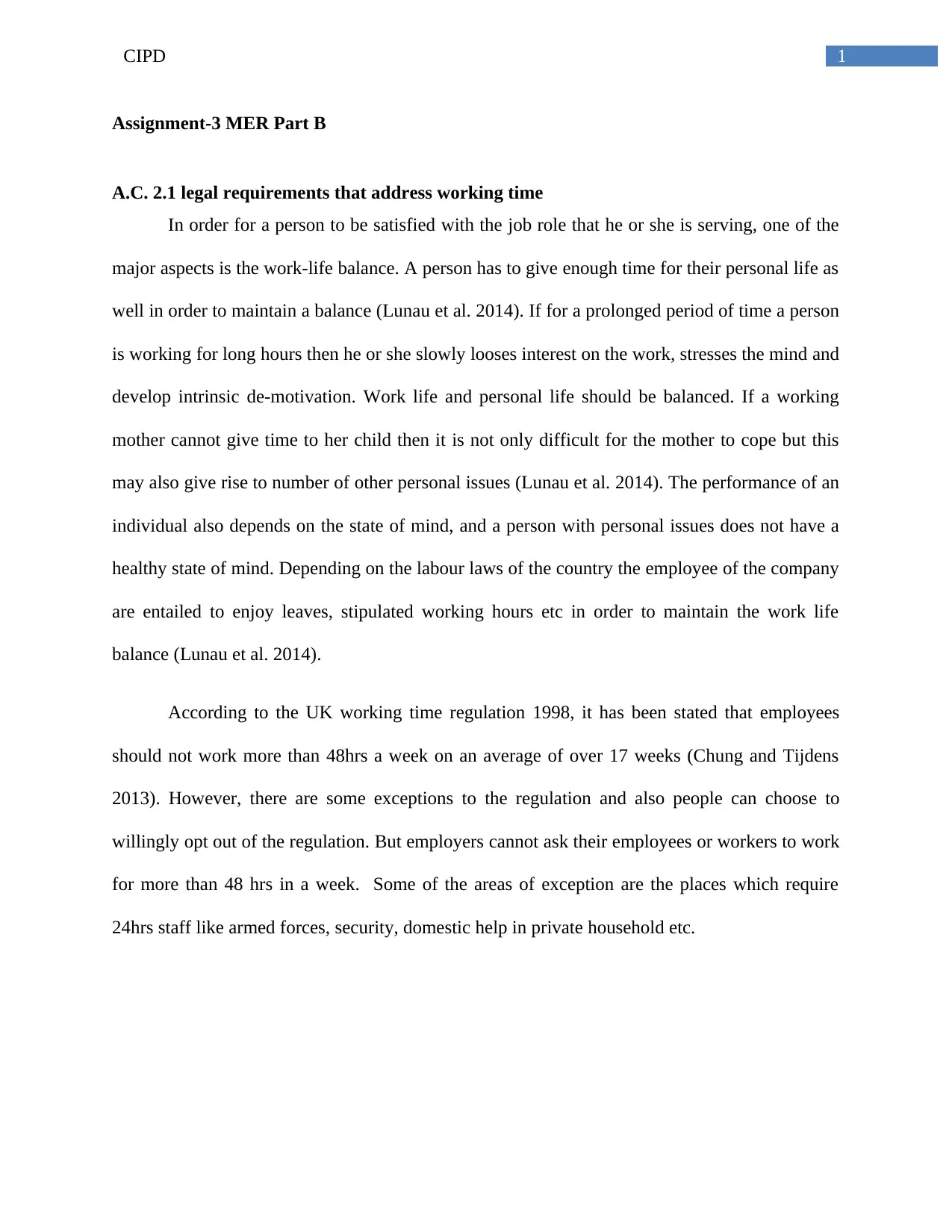
1CIPD
Assignment-3 MER Part B
A.C. 2.1 legal requirements that address working time
In order for a person to be satisfied with the job role that he or she is serving, one of the
major aspects is the work-life balance. A person has to give enough time for their personal life as
well in order to maintain a balance (Lunau et al. 2014). If for a prolonged period of time a person
is working for long hours then he or she slowly looses interest on the work, stresses the mind and
develop intrinsic de-motivation. Work life and personal life should be balanced. If a working
mother cannot give time to her child then it is not only difficult for the mother to cope but this
may also give rise to number of other personal issues (Lunau et al. 2014). The performance of an
individual also depends on the state of mind, and a person with personal issues does not have a
healthy state of mind. Depending on the labour laws of the country the employee of the company
are entailed to enjoy leaves, stipulated working hours etc in order to maintain the work life
balance (Lunau et al. 2014).
According to the UK working time regulation 1998, it has been stated that employees
should not work more than 48hrs a week on an average of over 17 weeks (Chung and Tijdens
2013). However, there are some exceptions to the regulation and also people can choose to
willingly opt out of the regulation. But employers cannot ask their employees or workers to work
for more than 48 hrs in a week. Some of the areas of exception are the places which require
24hrs staff like armed forces, security, domestic help in private household etc.
Assignment-3 MER Part B
A.C. 2.1 legal requirements that address working time
In order for a person to be satisfied with the job role that he or she is serving, one of the
major aspects is the work-life balance. A person has to give enough time for their personal life as
well in order to maintain a balance (Lunau et al. 2014). If for a prolonged period of time a person
is working for long hours then he or she slowly looses interest on the work, stresses the mind and
develop intrinsic de-motivation. Work life and personal life should be balanced. If a working
mother cannot give time to her child then it is not only difficult for the mother to cope but this
may also give rise to number of other personal issues (Lunau et al. 2014). The performance of an
individual also depends on the state of mind, and a person with personal issues does not have a
healthy state of mind. Depending on the labour laws of the country the employee of the company
are entailed to enjoy leaves, stipulated working hours etc in order to maintain the work life
balance (Lunau et al. 2014).
According to the UK working time regulation 1998, it has been stated that employees
should not work more than 48hrs a week on an average of over 17 weeks (Chung and Tijdens
2013). However, there are some exceptions to the regulation and also people can choose to
willingly opt out of the regulation. But employers cannot ask their employees or workers to work
for more than 48 hrs in a week. Some of the areas of exception are the places which require
24hrs staff like armed forces, security, domestic help in private household etc.
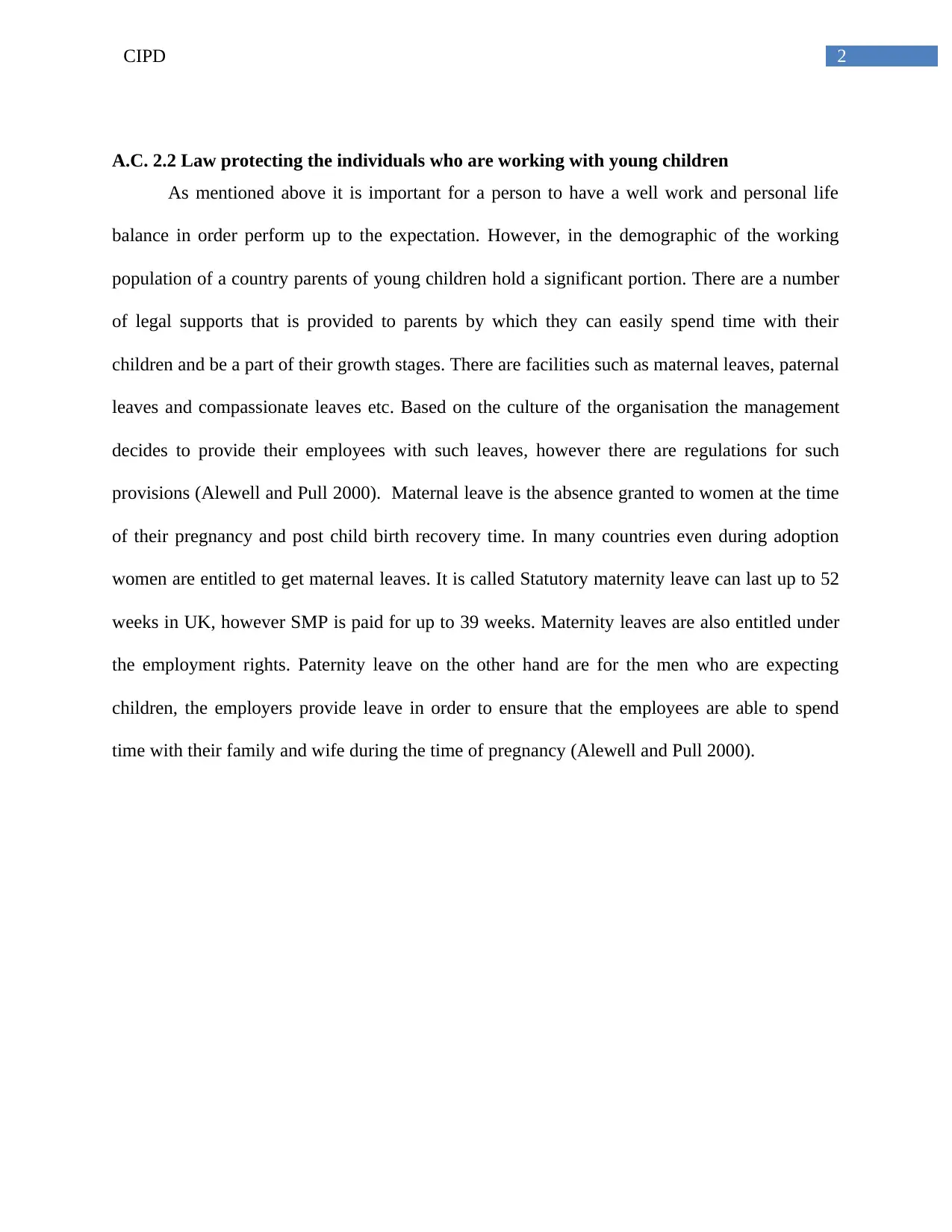
2CIPD
A.C. 2.2 Law protecting the individuals who are working with young children
As mentioned above it is important for a person to have a well work and personal life
balance in order perform up to the expectation. However, in the demographic of the working
population of a country parents of young children hold a significant portion. There are a number
of legal supports that is provided to parents by which they can easily spend time with their
children and be a part of their growth stages. There are facilities such as maternal leaves, paternal
leaves and compassionate leaves etc. Based on the culture of the organisation the management
decides to provide their employees with such leaves, however there are regulations for such
provisions (Alewell and Pull 2000). Maternal leave is the absence granted to women at the time
of their pregnancy and post child birth recovery time. In many countries even during adoption
women are entitled to get maternal leaves. It is called Statutory maternity leave can last up to 52
weeks in UK, however SMP is paid for up to 39 weeks. Maternity leaves are also entitled under
the employment rights. Paternity leave on the other hand are for the men who are expecting
children, the employers provide leave in order to ensure that the employees are able to spend
time with their family and wife during the time of pregnancy (Alewell and Pull 2000).
A.C. 2.2 Law protecting the individuals who are working with young children
As mentioned above it is important for a person to have a well work and personal life
balance in order perform up to the expectation. However, in the demographic of the working
population of a country parents of young children hold a significant portion. There are a number
of legal supports that is provided to parents by which they can easily spend time with their
children and be a part of their growth stages. There are facilities such as maternal leaves, paternal
leaves and compassionate leaves etc. Based on the culture of the organisation the management
decides to provide their employees with such leaves, however there are regulations for such
provisions (Alewell and Pull 2000). Maternal leave is the absence granted to women at the time
of their pregnancy and post child birth recovery time. In many countries even during adoption
women are entitled to get maternal leaves. It is called Statutory maternity leave can last up to 52
weeks in UK, however SMP is paid for up to 39 weeks. Maternity leaves are also entitled under
the employment rights. Paternity leave on the other hand are for the men who are expecting
children, the employers provide leave in order to ensure that the employees are able to spend
time with their family and wife during the time of pregnancy (Alewell and Pull 2000).
⊘ This is a preview!⊘
Do you want full access?
Subscribe today to unlock all pages.

Trusted by 1+ million students worldwide
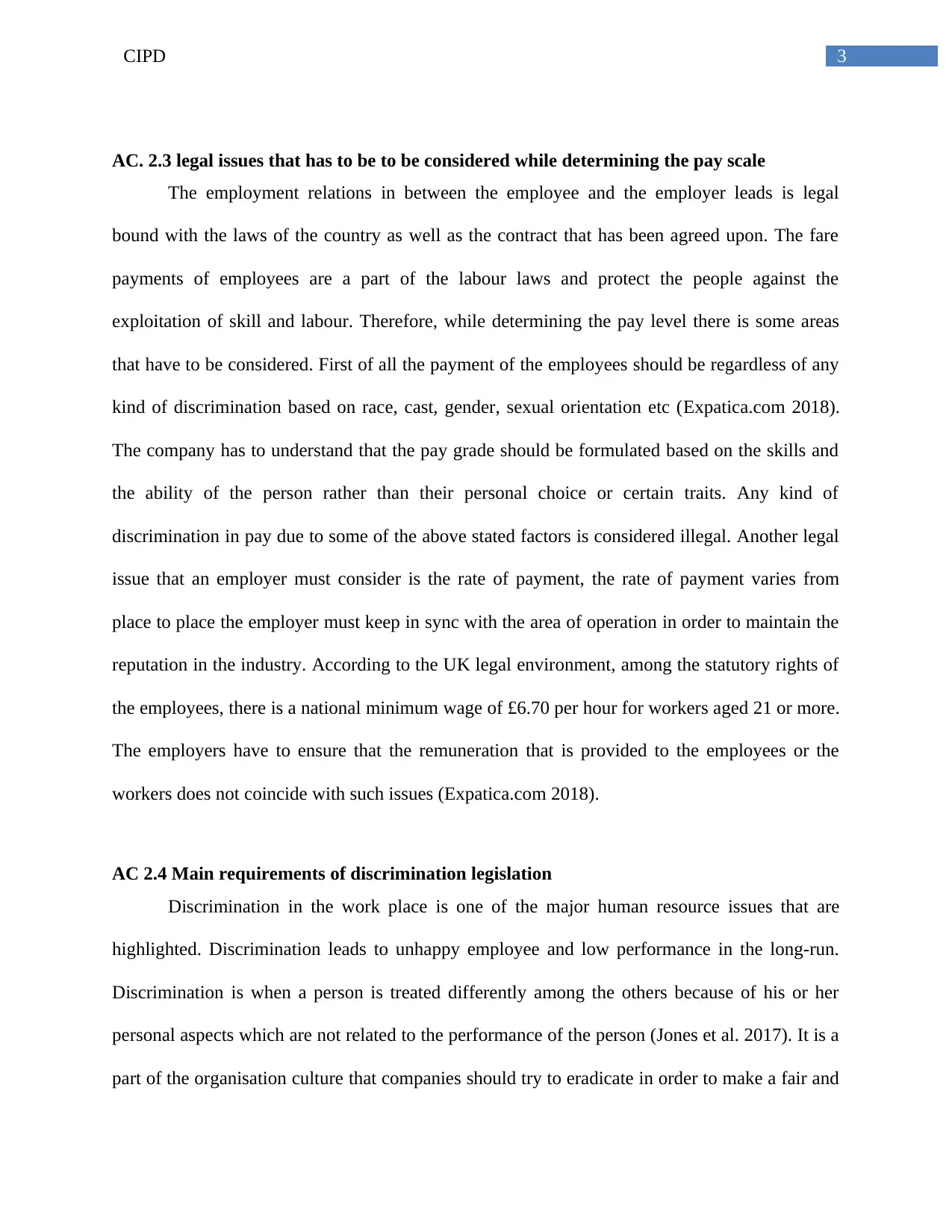
3CIPD
AC. 2.3 legal issues that has to be to be considered while determining the pay scale
The employment relations in between the employee and the employer leads is legal
bound with the laws of the country as well as the contract that has been agreed upon. The fare
payments of employees are a part of the labour laws and protect the people against the
exploitation of skill and labour. Therefore, while determining the pay level there is some areas
that have to be considered. First of all the payment of the employees should be regardless of any
kind of discrimination based on race, cast, gender, sexual orientation etc (Expatica.com 2018).
The company has to understand that the pay grade should be formulated based on the skills and
the ability of the person rather than their personal choice or certain traits. Any kind of
discrimination in pay due to some of the above stated factors is considered illegal. Another legal
issue that an employer must consider is the rate of payment, the rate of payment varies from
place to place the employer must keep in sync with the area of operation in order to maintain the
reputation in the industry. According to the UK legal environment, among the statutory rights of
the employees, there is a national minimum wage of £6.70 per hour for workers aged 21 or more.
The employers have to ensure that the remuneration that is provided to the employees or the
workers does not coincide with such issues (Expatica.com 2018).
AC 2.4 Main requirements of discrimination legislation
Discrimination in the work place is one of the major human resource issues that are
highlighted. Discrimination leads to unhappy employee and low performance in the long-run.
Discrimination is when a person is treated differently among the others because of his or her
personal aspects which are not related to the performance of the person (Jones et al. 2017). It is a
part of the organisation culture that companies should try to eradicate in order to make a fair and
AC. 2.3 legal issues that has to be to be considered while determining the pay scale
The employment relations in between the employee and the employer leads is legal
bound with the laws of the country as well as the contract that has been agreed upon. The fare
payments of employees are a part of the labour laws and protect the people against the
exploitation of skill and labour. Therefore, while determining the pay level there is some areas
that have to be considered. First of all the payment of the employees should be regardless of any
kind of discrimination based on race, cast, gender, sexual orientation etc (Expatica.com 2018).
The company has to understand that the pay grade should be formulated based on the skills and
the ability of the person rather than their personal choice or certain traits. Any kind of
discrimination in pay due to some of the above stated factors is considered illegal. Another legal
issue that an employer must consider is the rate of payment, the rate of payment varies from
place to place the employer must keep in sync with the area of operation in order to maintain the
reputation in the industry. According to the UK legal environment, among the statutory rights of
the employees, there is a national minimum wage of £6.70 per hour for workers aged 21 or more.
The employers have to ensure that the remuneration that is provided to the employees or the
workers does not coincide with such issues (Expatica.com 2018).
AC 2.4 Main requirements of discrimination legislation
Discrimination in the work place is one of the major human resource issues that are
highlighted. Discrimination leads to unhappy employee and low performance in the long-run.
Discrimination is when a person is treated differently among the others because of his or her
personal aspects which are not related to the performance of the person (Jones et al. 2017). It is a
part of the organisation culture that companies should try to eradicate in order to make a fair and
Paraphrase This Document
Need a fresh take? Get an instant paraphrase of this document with our AI Paraphraser
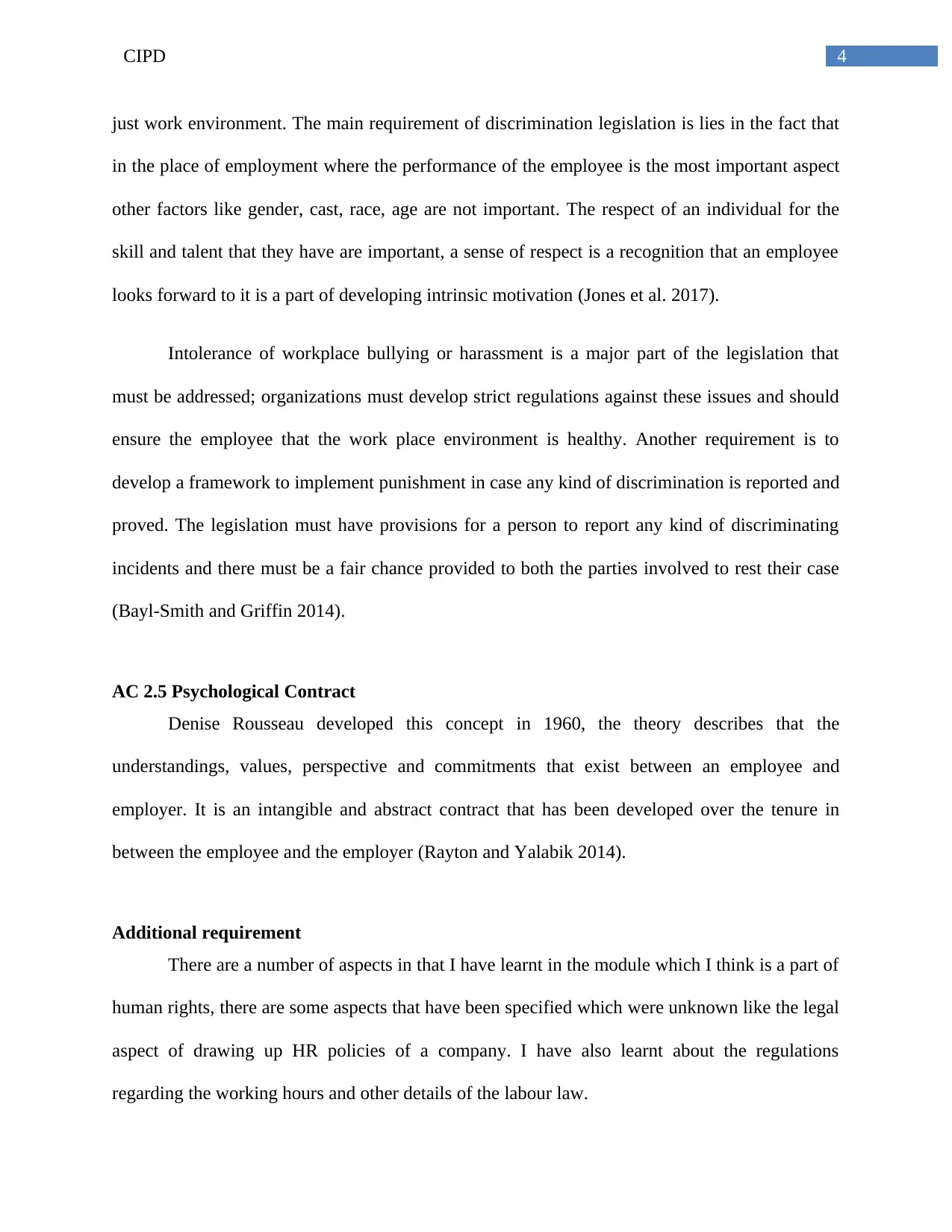
4CIPD
just work environment. The main requirement of discrimination legislation is lies in the fact that
in the place of employment where the performance of the employee is the most important aspect
other factors like gender, cast, race, age are not important. The respect of an individual for the
skill and talent that they have are important, a sense of respect is a recognition that an employee
looks forward to it is a part of developing intrinsic motivation (Jones et al. 2017).
Intolerance of workplace bullying or harassment is a major part of the legislation that
must be addressed; organizations must develop strict regulations against these issues and should
ensure the employee that the work place environment is healthy. Another requirement is to
develop a framework to implement punishment in case any kind of discrimination is reported and
proved. The legislation must have provisions for a person to report any kind of discriminating
incidents and there must be a fair chance provided to both the parties involved to rest their case
(Bayl‐Smith and Griffin 2014).
AC 2.5 Psychological Contract
Denise Rousseau developed this concept in 1960, the theory describes that the
understandings, values, perspective and commitments that exist between an employee and
employer. It is an intangible and abstract contract that has been developed over the tenure in
between the employee and the employer (Rayton and Yalabik 2014).
Additional requirement
There are a number of aspects in that I have learnt in the module which I think is a part of
human rights, there are some aspects that have been specified which were unknown like the legal
aspect of drawing up HR policies of a company. I have also learnt about the regulations
regarding the working hours and other details of the labour law.
just work environment. The main requirement of discrimination legislation is lies in the fact that
in the place of employment where the performance of the employee is the most important aspect
other factors like gender, cast, race, age are not important. The respect of an individual for the
skill and talent that they have are important, a sense of respect is a recognition that an employee
looks forward to it is a part of developing intrinsic motivation (Jones et al. 2017).
Intolerance of workplace bullying or harassment is a major part of the legislation that
must be addressed; organizations must develop strict regulations against these issues and should
ensure the employee that the work place environment is healthy. Another requirement is to
develop a framework to implement punishment in case any kind of discrimination is reported and
proved. The legislation must have provisions for a person to report any kind of discriminating
incidents and there must be a fair chance provided to both the parties involved to rest their case
(Bayl‐Smith and Griffin 2014).
AC 2.5 Psychological Contract
Denise Rousseau developed this concept in 1960, the theory describes that the
understandings, values, perspective and commitments that exist between an employee and
employer. It is an intangible and abstract contract that has been developed over the tenure in
between the employee and the employer (Rayton and Yalabik 2014).
Additional requirement
There are a number of aspects in that I have learnt in the module which I think is a part of
human rights, there are some aspects that have been specified which were unknown like the legal
aspect of drawing up HR policies of a company. I have also learnt about the regulations
regarding the working hours and other details of the labour law.

5CIPD
⊘ This is a preview!⊘
Do you want full access?
Subscribe today to unlock all pages.

Trusted by 1+ million students worldwide
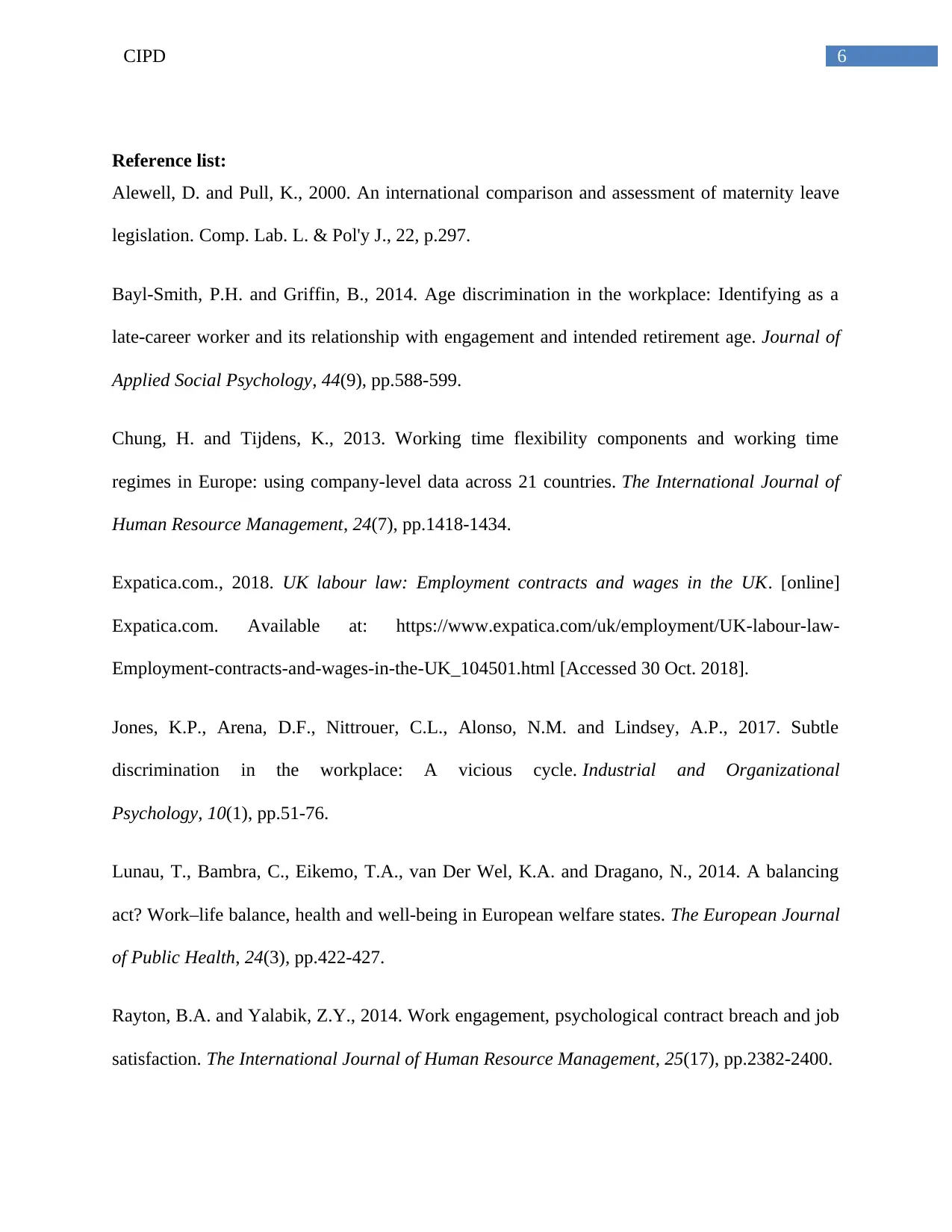
6CIPD
Reference list:
Alewell, D. and Pull, K., 2000. An international comparison and assessment of maternity leave
legislation. Comp. Lab. L. & Pol'y J., 22, p.297.
Bayl‐Smith, P.H. and Griffin, B., 2014. Age discrimination in the workplace: Identifying as a
late‐career worker and its relationship with engagement and intended retirement age. Journal of
Applied Social Psychology, 44(9), pp.588-599.
Chung, H. and Tijdens, K., 2013. Working time flexibility components and working time
regimes in Europe: using company-level data across 21 countries. The International Journal of
Human Resource Management, 24(7), pp.1418-1434.
Expatica.com., 2018. UK labour law: Employment contracts and wages in the UK. [online]
Expatica.com. Available at: https://www.expatica.com/uk/employment/UK-labour-law-
Employment-contracts-and-wages-in-the-UK_104501.html [Accessed 30 Oct. 2018].
Jones, K.P., Arena, D.F., Nittrouer, C.L., Alonso, N.M. and Lindsey, A.P., 2017. Subtle
discrimination in the workplace: A vicious cycle. Industrial and Organizational
Psychology, 10(1), pp.51-76.
Lunau, T., Bambra, C., Eikemo, T.A., van Der Wel, K.A. and Dragano, N., 2014. A balancing
act? Work–life balance, health and well-being in European welfare states. The European Journal
of Public Health, 24(3), pp.422-427.
Rayton, B.A. and Yalabik, Z.Y., 2014. Work engagement, psychological contract breach and job
satisfaction. The International Journal of Human Resource Management, 25(17), pp.2382-2400.
Reference list:
Alewell, D. and Pull, K., 2000. An international comparison and assessment of maternity leave
legislation. Comp. Lab. L. & Pol'y J., 22, p.297.
Bayl‐Smith, P.H. and Griffin, B., 2014. Age discrimination in the workplace: Identifying as a
late‐career worker and its relationship with engagement and intended retirement age. Journal of
Applied Social Psychology, 44(9), pp.588-599.
Chung, H. and Tijdens, K., 2013. Working time flexibility components and working time
regimes in Europe: using company-level data across 21 countries. The International Journal of
Human Resource Management, 24(7), pp.1418-1434.
Expatica.com., 2018. UK labour law: Employment contracts and wages in the UK. [online]
Expatica.com. Available at: https://www.expatica.com/uk/employment/UK-labour-law-
Employment-contracts-and-wages-in-the-UK_104501.html [Accessed 30 Oct. 2018].
Jones, K.P., Arena, D.F., Nittrouer, C.L., Alonso, N.M. and Lindsey, A.P., 2017. Subtle
discrimination in the workplace: A vicious cycle. Industrial and Organizational
Psychology, 10(1), pp.51-76.
Lunau, T., Bambra, C., Eikemo, T.A., van Der Wel, K.A. and Dragano, N., 2014. A balancing
act? Work–life balance, health and well-being in European welfare states. The European Journal
of Public Health, 24(3), pp.422-427.
Rayton, B.A. and Yalabik, Z.Y., 2014. Work engagement, psychological contract breach and job
satisfaction. The International Journal of Human Resource Management, 25(17), pp.2382-2400.
1 out of 7
Related Documents
Your All-in-One AI-Powered Toolkit for Academic Success.
+13062052269
info@desklib.com
Available 24*7 on WhatsApp / Email
![[object Object]](/_next/static/media/star-bottom.7253800d.svg)
Unlock your academic potential
Copyright © 2020–2026 A2Z Services. All Rights Reserved. Developed and managed by ZUCOL.




